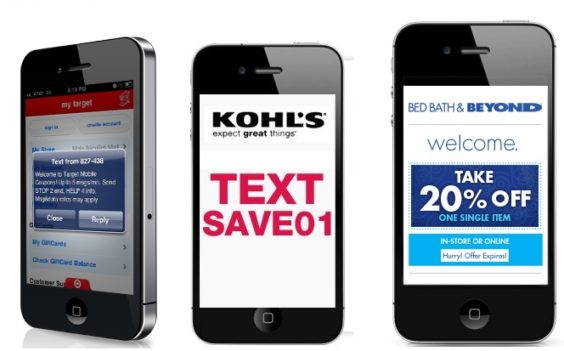
If you’ve signed up with your favorite store to get mobile coupons sent to your cell phone, better sign up again – and soon. Because if you don’t, in just a few days your favorite store won’t be sending you deals anymore.
In recent weeks, many cell phone users have been bombarded and befuddled by text alerts from companies like Target and Bed Bath & Beyond, urging them to respond in order to receive even more text alerts. If you’re among the recipients of any of these messages, you may have responded right away, or perhaps put them on your get-around-to-it-eventually list, or simply ignored the messages as spam.
The fact that many of the messages, depending on the sender, were written in “text speak” certainly didn’t help clear up any confusion. “To comply w/ new law, Reply OK to accept msgs from an autodialed system,” read one.
An “autodialed system”? That sounds suspicious. What “msgs” am I agreeing to accept exactly? And what is this “new law” anyway?
Turns out the messages that may have looked like spam, are actually meant to help combat spam.
Way back in February 2012, the FCC adopted new rules to protect consumers from unwanted telemarketing “robocalls”, that are neither dialed nor delivered by an actual human. The rules require advertisers “to obtain prior express written consent” before sending an automated telephone call – and they’ve been interpreted to apply to text messages, too.
The FCC gave advertisers plenty of time to comply. Even though the new rules were passed more than a year and a half ago, they don’t take effect until this Wednesday, October 16th. Hence the recent barrage of texts you may be getting, from companies scrambling to comply before the deadline.
So beginning Wednesday, no longer is simply asking you to text a code in order to opt in for alerts and coupons, enough for advertisers to comply with the law. Now they need your written permission, or they can’t text you any more.
Technically, “written consent” doesn’t mean you have to sign a form and mail it in – electronic signatures are okay. But if there’s ever a dispute, the burden of proof falls on the advertiser to show that you clearly gave your permission. So “reply OK to accept msgs”, as in the earlier example, may not be enough to satisfy the law’s requirements, if that simple “OK” is the only record of your consent that an advertiser has.
So no, the messages you’ve been getting are not spam. And yes, you have to do what the messages ask you to do, if you want to keep receiving them.
In addition to the aforementioned Target and Bed Bath & Beyond, dozens of other retailers offer coupons via text – Macy’s, Kohl’s, Office Depot – and many more offer to alert you to upcoming sales and special deals. So if you’ve signed up for a lot of them in the past, you’ll have to sign up for all of them again.
And it’s not limited to stores. Anyone with a product or service to sell, such as your local newspaper that offers to send you breaking news stories via text, will have to comply with the new rules. If they don’t, they could be forced to pay a substantial penalty for each and every unsolicited text they send.
Of course, that’s assuming there’s going to be someone available to impose any penalties. Along with most other U.S. government agencies, the FCC is currently shut down. Therefore, “consumer complaint and inquiry phone lines cannot be answered,” an FCC notice reads, and “consumer protection and local competition enforcement must cease.”
So if you haven’t re-opted in for any text alerts you’ve signed up for in the past, you shouldn’t necessarily be thinking lawsuit if you get a text after Wednesday. Advertisers have already had 20 months to get you to sign up again. But as long as the government remains shut down, they may find themselves with just a little more time to entice you with a few good coupons via text, in the hopes of keeping your business – and your cell phone number.
Image sources: Target.com, Kohls.com, BedBathandBeyond.com











Pingback: So Why Did Kellogg’s Text Me, When I Already Opted In? | Hopster Coupon Labs